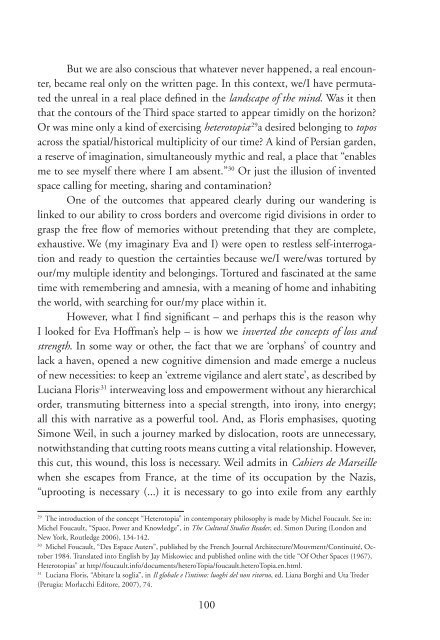Teaching Subjectivity. Travelling Selves for Feminist ... - MailChimp
Teaching Subjectivity. Travelling Selves for Feminist ... - MailChimp
Teaching Subjectivity. Travelling Selves for Feminist ... - MailChimp
Create successful ePaper yourself
Turn your PDF publications into a flip-book with our unique Google optimized e-Paper software.
But we are also conscious that whatever never happened, a real encounter,<br />
became real only on the written page. In this context, we/I have permutated<br />
the unreal in a real place defined in the landscape of the mind. Was it then<br />
that the contours of the Third space started to appear timidly on the horizon?<br />
Or was mine only a kind of exercising heterotopia ,29 a desired belonging to topos<br />
across the spatial/historical multiplicity of our time? A kind of Persian garden,<br />
a reserve of imagination, simultaneously mythic and real, a place that “enables<br />
me to see myself there where I am absent.” 30 Or just the illusion of invented<br />
space calling <strong>for</strong> meeting, sharing and contamination?<br />
One of the outcomes that appeared clearly during our wandering is<br />
linked to our ability to cross borders and overcome rigid divisions in order to<br />
grasp the free flow of memories without pretending that they are complete,<br />
exhaustive. We (my imaginary Eva and I) were open to restless self-interrogation<br />
and ready to question the certainties because we/I were/was tortured by<br />
our/my multiple identity and belongings. Tortured and fascinated at the same<br />
time with remembering and amnesia, with a meaning of home and inhabiting<br />
the world, with searching <strong>for</strong> our/my place within it.<br />
However, what I find significant – and perhaps this is the reason why<br />
I looked <strong>for</strong> Eva Hoffman’s help – is how we inverted the concepts of loss and<br />
strength. In some way or other, the fact that we are ‘orphans’ of country and<br />
lack a haven, opened a new cognitive dimension and made emerge a nucleus<br />
of new necessities: to keep an ‘extreme vigilance and alert state’, as described by<br />
Luciana Floris ,31 interweaving loss and empowerment without any hierarchical<br />
order, transmuting bitterness into a special strength, into irony, into energy;<br />
all this with narrative as a powerful tool. And, as Floris emphasises, quoting<br />
Simone Weil, in such a journey marked by dislocation, roots are unnecessary,<br />
notwithstanding that cutting roots means cutting a vital relationship. However,<br />
this cut, this wound, this loss is necessary. Weil admits in Cahiers de Marseille<br />
when she escapes from France, at the time of its occupation by the Nazis,<br />
“uprooting is necessary (...) it is necessary to go into exile from any earthly<br />
29<br />
The introduction of the concept “Heterotopia” in contemporary philosophy is made by Michel Foucault. See in:<br />
Michel Foucault, “Space, Power and Knowledge”, in The Cultural Studies Reader, ed. Simon During (London and<br />
New York, Routledge 2006), 134-142.<br />
30<br />
Michel Foucault, “Des Espace Auters”, published by the French Journal Architecture/Mouvment/Continuité, October<br />
1984. Translated into English by Jay Miskowiec and published online with the title “Of Other Spaces (1967),<br />
Heterotopias” at http//foucault.info/documents/heteroTopia/foucault.heteroTopia.en.html.<br />
31<br />
Luciana Floris, “Abitare la soglia”, in Il globale e l’intimo: luoghi del non ritorno, ed. Liana Borghi and Uta Treder<br />
(Perugia: Morlacchi Editore, 2007), 74.<br />
100

















